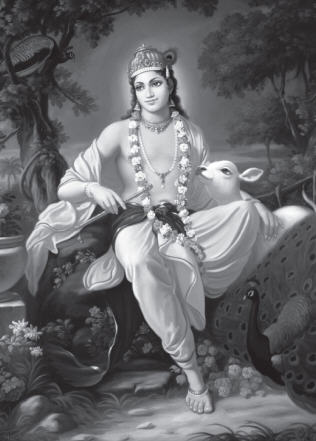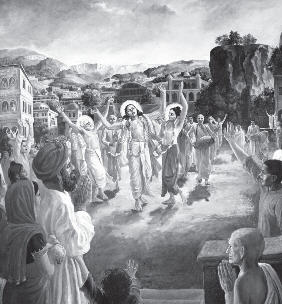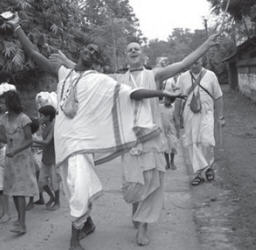Can God change His mind?
Srila Prabhupada had confidently predicted an imminent nuclear war between the USSR and the USA. It did not happen. Prabhupada was asked why. His response: Krsna had changed His mind.
Until I heard about Prabhupada's statement, I had never even entertained the notion of God's changing His mind. But prompted to think about it, how could I deny the possibility?
Of course, I had, for some time, acknowledged that the Absolute Truth is a person . The Srimad Bhagavatam reports that those who have seen that ultimate source of all energies know it as undifferential illimitable spiritual light (brahman), as the all knowing guiding Self within all selves (paramatma) , and as the transcendent enjoying Self endowed with spiritual senses, that is to say, a person (bhagavan ). That unique individual is, in Prabhupada's phrase, "The Supreme Personality of Godhead."
If the Absolute, the source of everything, is a person , then the uncountable sentient beings in the world, gifted with senses , derive their own personhood from the divine prototype . We are, as Prabhupada says, "small samples of God." This implies that we can understand God by studying ourselves, for whatever we posses in small measure God possesses in full.
And so: if we can change our minds, then Krsna can also.
Our freedom is tiny, for we are encaged by material nature. God's freedom is unlimited, for He conttols material nature. Of course He can change His mind and act on it without restraint.

FIXED AND FROZEN FROM ETERNITY
Now there are theologies which tend to deny God this ability. If God is fully perfect, the thinking goes, what would be the reason for His changing His mind? He would have no occasion to. He would never have to correct His course upon learning something new, come up with an improved plan , adjust to unforeseen circumstances. There is nothing unforeseen.
God knows all, past , present and future. From His coign of vantage in eternity, He sees all time in one glance. All future contingencies are settled once and for all. It follows
from divine omniscience that God cannot "change his mind." He never needs to. From this view of omniscience and of the related idea of time, neither God nor humans during the world's course exercise any freedom of choice. Beginning, middle, and end past , present, and future all is fixed and frozen from eternity.
Although God and humans may seem to make ch oices and d ecisions often, as recorded in the literature of divine-human interactions, in response to each other it is all a kind of illusion , a make believe, a pretense. In fact, since everything has been decided from eternity, creation is radically devalued: it is a superfluous, nugatory manifestation of what has already been decided. Creation goes on with God and humans alike shackled in a metaphysical cage. Both divinity and humanity have been depersonalized, and the relation between them evacuated of all emotional richness and potential for increasing intimacy.God's creation is no more than a police state, from which a few will be inexplicably released while the many remain inexplicably incarcerated.
These are the strict implications of this view of divine omniscience.
FREE TO CHOOSE
Let me begin presenting an alternative with an examination of the notion of 'free will'. Like all followers of Vedic thinking, Prabhupada teaches that we have genuine free will. (The Vedas contain injunctions, telling us what we ought and ought not to do. What would be the use of such injunctions were we not free to choose?)
'Free will' implies that whenever we exercise our free choice, all the causal forces of our physical and mental conditioning our karma included are insufficient to account
for the outcome. There is another factor involved in the outcome our own free choice. The word 'free' denotes that element not caused or determined by the past. Yet that element of freedom does affect the future. Hence, our own uncaused free choice has added something to the determinateness of reality.

Even a person with full and perfect knowledge of the past could not predict with certainty the outcome of a choice by a free agent. I the free agent may have a particular nature, I may have long standing habits and predispositions, and on the basis of that an observer could make a prediction with a good chance of success. But if my free choice is involved, there will always be an area of indeterminateness, of uncertainty.
What about God? Certainly the divine omniscience entails that God knows the outcome even of a free decision.
Those who take this position assume that the outcome is already there to be known. They presuppose that the contents of past, present and future are objectively of the same nature. These people conceive of time on the analogy of an old fashioned motion-picture film advancing through a projector. The present is like the frame directly behind the lens. The past is the already viewed film wound on the uptake spool, and the future is the unviewed film still wound up on the feed spool. Thus, the future is fixed and determinate, just like the pastonly it hasn't happened yet.
A FUZZY FUTURE
Now, put the film analogy out of your mind. Consider, instead, that the future is not just like the past-forever fixed and unalterable. Consider that the future as such is objectively indeterminate, fuzzy, fluid. When God sees the future perfectly, then, he sees it precisely as it is-fuzzy, composed essentially of possibilities.

The indeterminacy, the fuzziness of the future arises from the freedom of moral agents in the world. Each of the innumerable spiritual beings, the selves , acting in the world has its own minute freedom, and the supreme spiritual being, the Superself, has his boundless freedom. The pending decision of these free agents endows the future with elements that are objectively unsettled, regions of open, alternative possibilities.
Of course, some aspects of the future are fixed or d etermined with a high degree of certainty. It is well know, for example, how the vedic literature describes the movement of his history through the great yuga cycles, setting forth the generic characteristic of each age. Those who know these texts can predict the future. The Srimad-Bhagavatam, for example, relates how Vyasadeva foresaw the impending Kali-yuga; Prabhupada explains Vyasa's vision with this example: "As an astrologer can see the future fate of a man, or an astronomer can foretell the solar and lunar eclipses, those liberated souls who can see through the scriptures can foretell the future of all mankind."
Yet even the ordained constraints on things to come cannot annihilate possibilities of freedom. The degree of indeterminateness for any given future time-frame may be great or small, and it may well fluctuate as it draws near to the present. In any case, the indeterminacies of tlle future await final determination by the decisions of free agents, who, by acting in the present, produce the fixed and unchangeable record knows as the past.
A FORECAST OF HARE KRSNA MOVEMENT
Prabhupada himself was quite aware of both the determinate and the indeterminate areas of the future. In a letter to Karandhara (November, 1970) Prabhupada writes about the free choice open to his own disciples:
It is most encouraging to me to see that you are spreading this movement so nicely and I thank you for this. Lord Caitanya Mahaprabhu has forecast that this Hare Krsna Mantra will be heard in every nook and cranny of the globe. He is God, so it will happen, that is a fact. So if we take advantage then we may take the credit, but if we do not someone else will.
Prabhupada repeatedly urged, exhorted, and encouraged his followers to dedicate themselves completely to the mission of Lord Caitanya, who descended to promulgate the dharma for this age, the chanting of the names of God. Caitanya's appearance was predicted in the Srimad Bhagavatam. And Caitanya Himself is quoted in Caitanya-Bhagavata as predicting "In as many towns and villages as there are on earth , everywhere, My name will be broadcast."
This much, Prabhupada says, is fixed, settled. It will happen. But who will do it? How will it happen? That is still unsettled. Prabhupada therefore urges his disciples to "take advantage" of the opportunity afforded by Caitanya's mercy. Divine grace has been offered, but it remains up to his disciples to accept it or not; it is their free choice. If we disciples decide to accept it, then "we will get the credit." If we reject this offer if we decide we'd rather spend our lives in other pursuits then someone else will accept Caitanya's offer.
We have our freedom. God is all powerful, and all of us must be under the divine control at all times. But we do have the scope to freely choose how we wish to be controlled. We can be controlled indirectly and unfavorably through the agency of material energy (Durga). Or we can be controlled directly and favorably through the agency of the spiritual energy (Radharani). Our freedom is for this choice.
And Krsna facilitates our choice. Even when we against His wishes turn from Him, run from Him, hide from Him, He alone makes it possible, provides us with the means and the power to do so. In this way, Krsna enables us to do what He does not want us to do.

And even as He empowers us to reject Him, He also tries to bring us back, to rescue us, to reestablish our relationship. But He always carefully respects our freedom. If we had no freedom, we would be no more than lifeless machines, automatons. But Krsna produced living beings endowed with His own qualities freedom among them so that there would be others with whom He could engage in ever intensifying exchanges of love. Without freedom, the reciprocities of love would be impossible. The eternal exchanges of love between Krsna and His devotees produce a dynamic of ever expanding, ever intensifying transcendent joy, beauty and wisdom. This is the divine life. Participation in this life is our purpose and the right use of our freedom.
Freedom a lways permits its wrong use, and that misuse engen ders the material world, a place created for the drop outs. Krsna does not want the world to be the way it is. This world is the way it is because it is filled up with His fallen devotees, vying with one another in a free for all to consummate their personal God projects. Thus they go ravening through history, taking turns as predator and prey, destroying and being destroyed by fang and claw, by fist and club, by ICBM and lED.
In 1975 the world's accumulated burden of misdeeds had reached a point that nuclear destruction was imminent. This was the world's future. So Prabhupada foresaw. Then Krsna changed his mind. The world had anoth er future.
Ravindra Svarapa Dasa is a disciple of Srila Prabhupada, and a guru and member of Governing Body Commission. He holds a Ph.D. In religion from Temple University.
